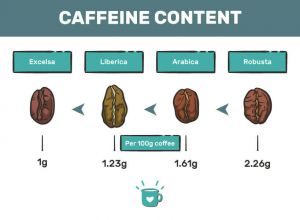How Much Caffeine is in Coffee?
Coffee is a popular beverage consumed by millions of people worldwide. Known for its energizing effects, coffee is often the go-to drink for those who need a quick pick-me-up. One of the main components of coffee that contributes to its stimulant properties is caffeine. How much caffeine is in coffee? How does it affect the human body? Let’s find out!
What is Caffeine?
Caffeine is a naturally occurring compound found in coffee beans, tea leaves, cocoa beans, and some other plants. It is a stimulant that can help increase alertness and concentration, and reduce fatigue. Caffeine works by blocking the action of a neurotransmitter called adenosine, which is responsible for promoting sleep and suppressing arousal.
How Much Caffeine is in Coffee?
The amount of caffeine in coffee can vary depending on a number of factors, including the type of coffee beans used, the brewing method, and the serving size. On average, an 8-ounce (240 ml) cup of coffee contains about 95 milligrams of caffeine. However, this amount can range from as little as 30 milligrams to as much as 200 milligrams or more, depending on the factors mentioned above.
The Type of Coffee Beans
The type of coffee beans used can have a significant impact on the caffeine content of the coffee. For example, Robusta coffee beans contain about twice as much caffeine as Arabica coffee beans. Often made from Robusta beans, Instant coffee typically contains much more caffeine than regular brewed coffee.

How it’s Brewed
The brewing method can also affect the caffeine content of coffee. For example, Espresso is made by forcing hot water through finely ground coffee beans at high pressure. This results in a concentrated and potent shot of coffee. Espresso typically contains about 60-80 milligrams of caffeine per shot, which is less than a regular cup of coffee. But, you may end up drinking more than one shot since Espresso is typically served in smaller portions. This can add up to a higher caffeine intake.
The Serving Size
The serving size of coffee is also a crucial factor in determining how much caffeine you consume. The standard serving size for a cup of coffee is 8 ounces, but many coffee shops serve larger sizes, such as 12 or 16 ounces. A larger cup of coffee may contain more caffeine than a smaller cup, even if they are made with the same amount of coffee beans.
Affects on the Human Body
When consumed in moderate amounts, caffeine can help improve cognitive function, increase alertness and concentration, and enhance physical performance. However, consuming too much caffeine can lead to negative side effects, such as jitteriness, anxiety, heart palpitations, and difficulty sleeping. The amount of caffeine that constitutes a moderate intake can vary from person to person, but the general guideline is to consume no more than 400 milligrams of caffeine per day, which is roughly equivalent to four 8-ounce cups of coffee.
The amount of caffeine in coffee can vary depending on a number of factors, including the type of coffee beans used, the brewing method, and the serving size. On average, an 8-ounce cup of coffee contains about 95 milligrams of caffeine, but this amount can range from 30 to 200 milligrams or more. When consumed in moderation, caffeine can have positive effects on cognitive function and physical performance, but excessive intake can lead to negative side effects. It’s essential to be mindful of your caffeine intake and consume it in moderation to reap its benefits without experiencing adverse effects.